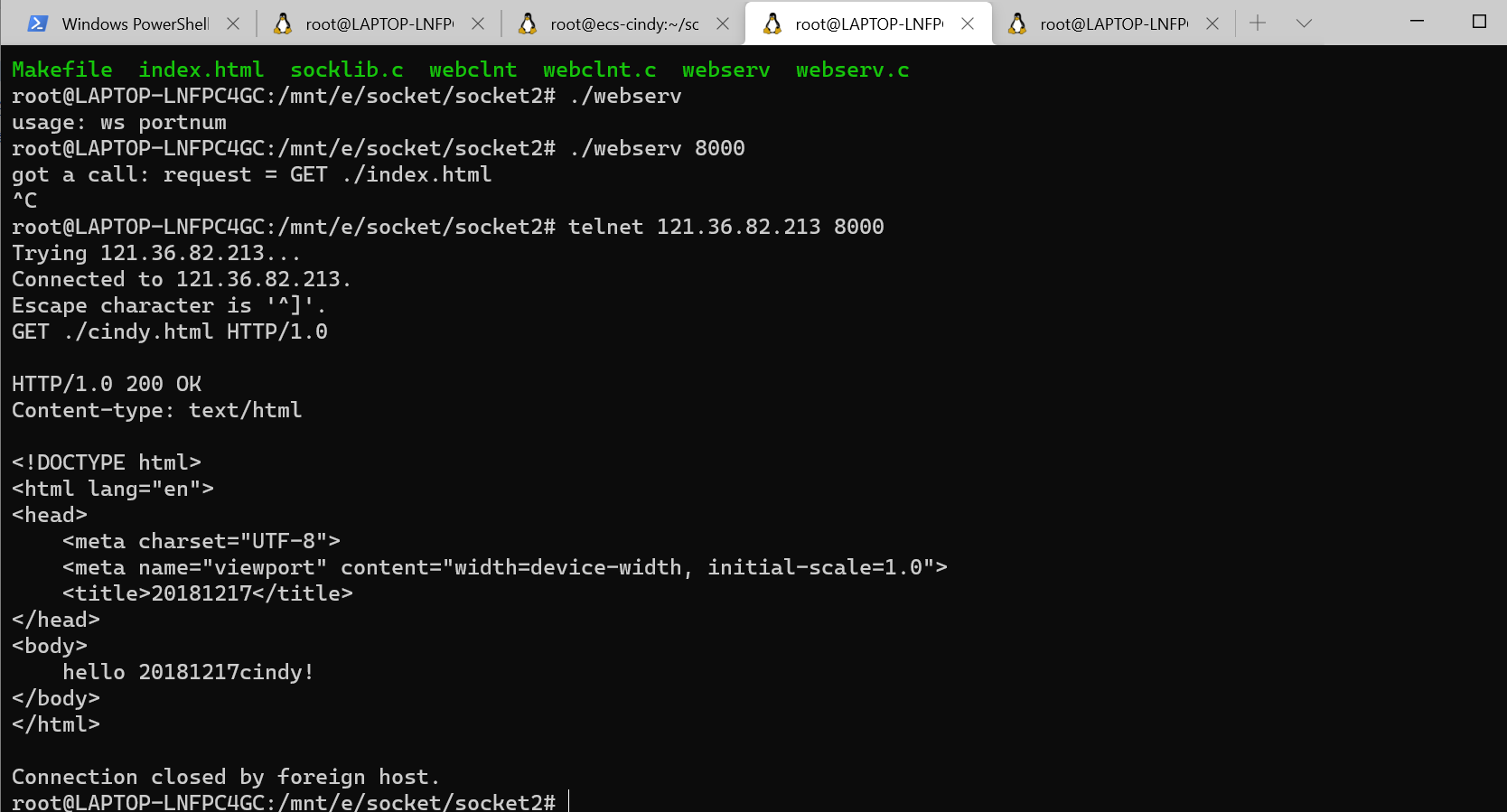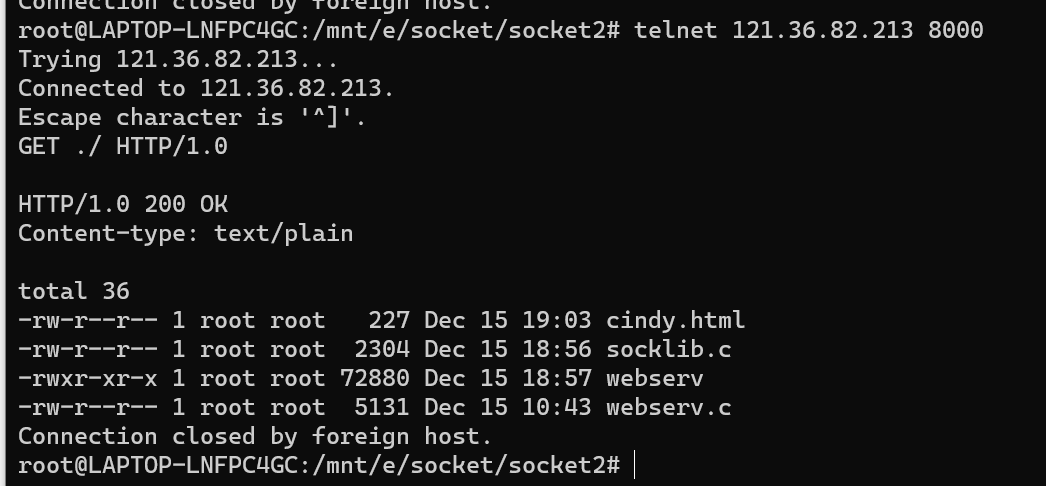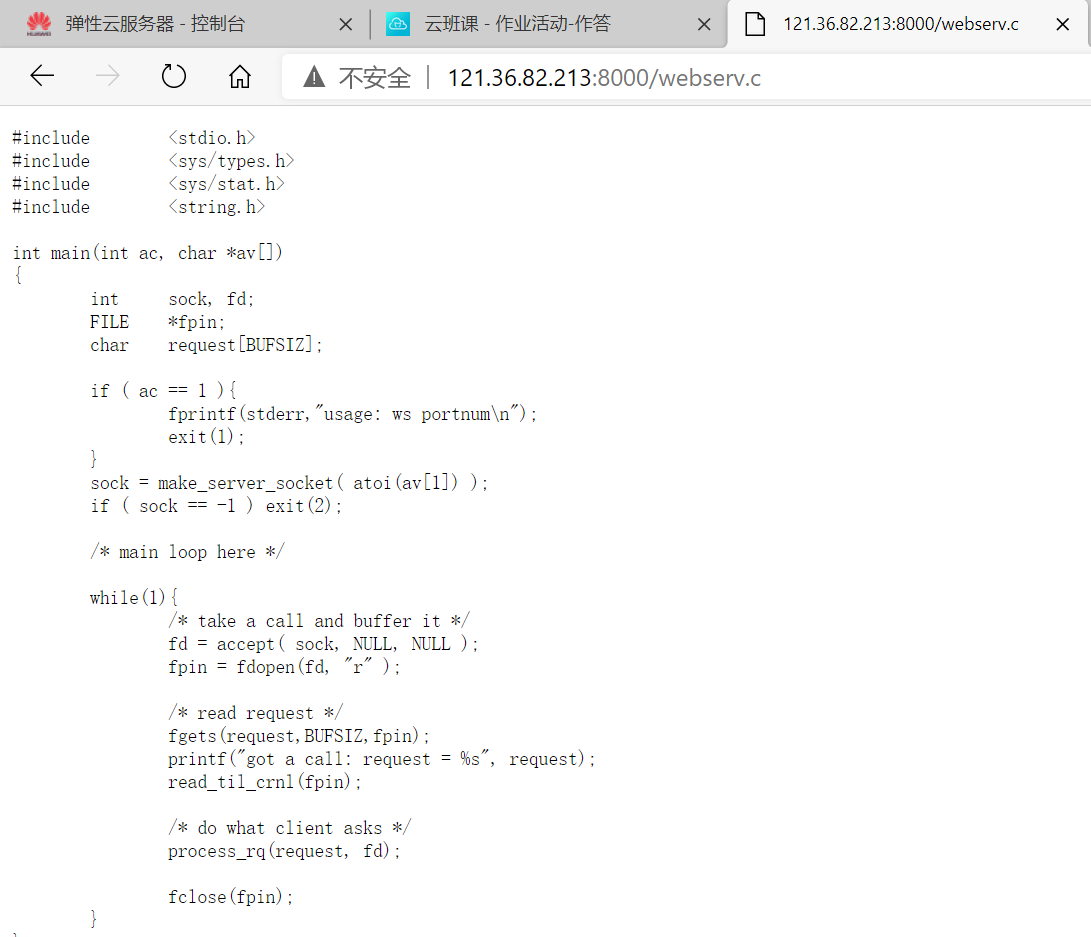服务器端代码:
#include <stdio.h> #include <sys/types.h> #include <sys/stat.h> #include <string.h> int main(int ac, char *av[]) { int sock, fd; FILE *fpin; char request[BUFSIZ]; if ( ac == 1 ){ fprintf(stderr,"usage: ws portnum "); exit(1); } sock = make_server_socket( atoi(av[1]) ); if ( sock == -1 ) exit(2); /* main loop here */ while(1){ /* take a call and buffer it */ fd = accept( sock, NULL, NULL ); fpin = fdopen(fd, "r" ); /* read request */ fgets(request,BUFSIZ,fpin); printf("got a call: request = %s", request); read_til_crnl(fpin); /* do what client asks */ process_rq(request, fd); fclose(fpin); } } /* ------------------------------------------------------ * read_til_crnl(FILE *) skip over all request info until a CRNL is seen ------------------------------------------------------ */ read_til_crnl(FILE *fp) { char buf[BUFSIZ]; while( fgets(buf,BUFSIZ,fp) != NULL && strcmp(buf," ") != 0 ) ; } /* ------------------------------------------------------ * process_rq( char *rq, int fd ) do what the request asks for and write reply to fd handles request in a new process rq is HTTP command: GET /foo/bar.html HTTP/1.0 ------------------------------------------------------ */ process_rq( char *rq, int fd ) { char cmd[BUFSIZ], arg[BUFSIZ]; /* create a new process and return if not the child */ if ( fork() != 0 ) return; strcpy(arg, "./"); /* precede args with ./ */ if ( sscanf(rq, "%s%s", cmd, arg+2) != 2 ) return; if ( strcmp(cmd,"GET") != 0 ) cannot_do(fd); else if ( not_exist( arg ) ) do_404(arg, fd ); else if ( isadir( arg ) ) do_ls( arg, fd ); else if ( ends_in_cgi( arg ) ) do_exec( arg, fd ); else do_cat( arg, fd ); } /* ------------------------------------------------------ * the reply header thing: all functions need one if content_type is NULL then don't send content type ------------------------------------------------------ */ header( FILE *fp, char *content_type ) { fprintf(fp, "HTTP/1.0 200 OK "); if ( content_type ) fprintf(fp, "Content-type: %s ", content_type ); } /* ------------------------------------------------------ * simple functions first: cannot_do(fd) unimplemented HTTP command and do_404(item,fd) no such object ------------------------------------------------------ */ cannot_do(int fd) { FILE *fp = fdopen(fd,"w"); fprintf(fp, "HTTP/1.0 501 Not Implemented "); fprintf(fp, "Content-type: text/plain "); fprintf(fp, " "); fprintf(fp, "That command is not yet implemented "); fclose(fp); } do_404(char *item, int fd) { FILE *fp = fdopen(fd,"w"); fprintf(fp, "HTTP/1.0 404 Not Found "); fprintf(fp, "Content-type: text/plain "); fprintf(fp, " "); fprintf(fp, "The item you requested: %s is not found ", item); fclose(fp); } /* ------------------------------------------------------ * the directory listing section isadir() uses stat, not_exist() uses stat do_ls runs ls. It should not ------------------------------------------------------ */ isadir(char *f) { struct stat info; return ( stat(f, &info) != -1 && S_ISDIR(info.st_mode) ); } not_exist(char *f) { struct stat info; return( stat(f,&info) == -1 ); } do_ls(char *dir, int fd) { FILE *fp ; fp = fdopen(fd,"w"); header(fp, "text/plain"); fprintf(fp," "); fflush(fp); dup2(fd,1); dup2(fd,2); close(fd); execlp("ls","ls","-l",dir,NULL); perror(dir); exit(1); } /* ------------------------------------------------------ * the cgi stuff. function to check extension and one to run the program. ------------------------------------------------------ */ char * file_type(char *f) /* returns 'extension' of file */ { char *cp; if ( (cp = strrchr(f, '.' )) != NULL ) return cp+1; return ""; } ends_in_cgi(char *f) { return ( strcmp( file_type(f), "cgi" ) == 0 ); } do_exec( char *prog, int fd ) { FILE *fp ; fp = fdopen(fd,"w"); header(fp, NULL); fflush(fp); dup2(fd, 1); dup2(fd, 2); close(fd); execl(prog,prog,NULL); perror(prog); } /* ------------------------------------------------------ * do_cat(filename,fd) sends back contents after a header ------------------------------------------------------ */ do_cat(char *f, int fd) { char *extension = file_type(f); char *content = "text/plain"; FILE *fpsock, *fpfile; int c; if ( strcmp(extension,"html") == 0 ) content = "text/html"; else if ( strcmp(extension, "gif") == 0 ) content = "image/gif"; else if ( strcmp(extension, "jpg") == 0 ) content = "image/jpeg"; else if ( strcmp(extension, "jpeg") == 0 ) content = "image/jpeg"; fpsock = fdopen(fd, "w"); fpfile = fopen( f , "r"); if ( fpsock != NULL && fpfile != NULL ) { header( fpsock, content ); fprintf(fpsock, " "); while( (c = getc(fpfile) ) != EOF ) putc(c, fpsock); fclose(fpfile); fclose(fpsock); } exit(0); }
远程登录华为云,以及运行服务器代码:

本地wsl中充当客户端:telnet 121.36.82.213 8000

eg2:

此时的服务器端显示:

在本地服务器上登录121.36.82.213:8000可得:(此时本地浏览器充当客户端,在华为云web服务器端上有显示:(eg:got a call: request = GET / HTTP/1.1)



